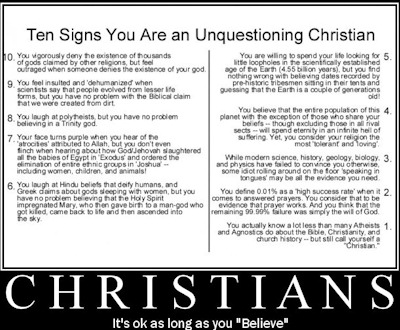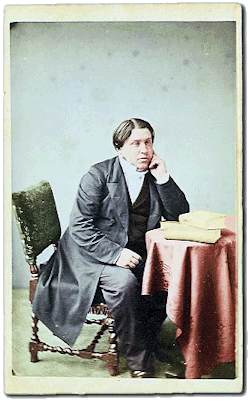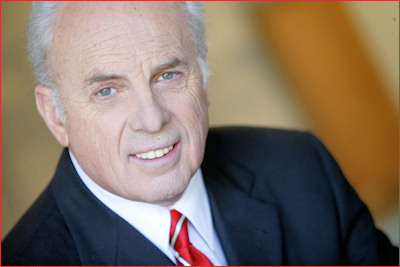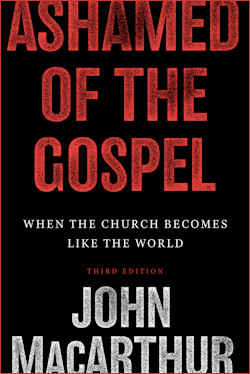posted by Phil Johnson
 No punishment required?
No punishment required?Spurgeon and penal substitution revisited
(First posted 26 October 2005)

The PyroManiacs devote some space each weekend to highlights from The Spurgeon Archive. This week, I'm rerunning an old post I encountered while researching my seminar for next week's Shepherds' Conference. (I'll be doing a seminar on the life and controversies of Spurgeon during the conference.) This post explored the question of whether Spurgeon would truly fight for penal substitution against the likes of Steve Chalke, Brian McLaren, and Rob Bell, or was he just a quaint old fogey whose understanding of atonement was naive, and hung somewhere between Anselm and Calvin? Read the sermon referred to and linked below if you want Spurgeon's own answer to that question.
 couple of Brit-bloggers, Steve and Sven, both noticed Monday's Spurgeon quote and voiced doubts about whether Spurgeon really believed in the penal-substitution view of the atonement.
couple of Brit-bloggers, Steve and Sven, both noticed Monday's Spurgeon quote and voiced doubts about whether Spurgeon really believed in the penal-substitution view of the atonement.Steve writes,
|
(For Yank readers who wonder what Steve means, Victor Meldrew was an elderly character in the Britcom One Foot in the Grave, known for his ill-tempered grousing.)
Steve then opines:
|
Actually, in such a context, the recompense Spurgeon spoke of (the payment of which he "fairly clearly" says was "render[ed] to God's justice") is nothing if not punitive. I suppose if you don't understand Spurgeon and aren't familiar with Victorianisms, you might not catch that idea on your initial reading of this particular quote, but for the record, Steve has badly misread what Spurgeon is saying.
Anyway, in a note added after posting, Steve refers his readers to The World of Sven, promising, "Sven says this better."
Sven actually says it much worse: "Spurgeon himself seems to have gotten stuck halfway between Anselm and the classic Reformed position." Sven quotes a sentence from Spurgeon, ("My conscience tells me that I must render to God's justice a recompense for the dishonor that I have done to His law, and I cannot find anything which bears the semblance of such a recompense till I look to Christ Jesus.") and asks:
|
Nor would Spurgeon ever have approved of paring back the definition of "at-one-ment" to reconciliation only.
It's extremely irritating that after more than two years of controversy, Steve Chalke and his aficionados still seem blithely ignorant about the historical debate among British Baptists over the doctrine of penal substitution. It's always annoyed me that Chalke, who ministered at Haddon Hall—a chapel founded by Spurgeon's own congregation and named for him—decided to champion this issue, and then has handled the ensuing controversy in such a clumsy and perfunctory way.
Here's a message where Spurgeon explains himself with absolute clarity and without the Victorian euphemisms. Whenever Spurgeon spoke of "substitutionary atonement," here, in his own words, is what he had in mind:
"The doctrine of Holy Scripture is this, that inasmuch as man could not keep God's law, having fallen in Adam, Christ came and fulfilled the law on the behalf of his people; and that inasmuch as man had already broken the divine law and incurred the penalty of the wrath of God, Christ came and suffered in the room, place, and stead of his elect ones, that so by his enduring the full vials of wrath, they might be emptied out and not a drop might ever fall upon the heads of his blood-bought people."
"Christ—Our Substitute" is one of my all-time favorite Spurgeon sermons, because Spurgeon's passion is conveyed in the words. You don't have to know what he actually sounded like to sense the fervor with which he defended the atonement against the Steve Chalkes of his day:
These are the new men whom God has sent down from heaven, to tell us that the apostle Paul was all wrong, that our faith is vain, that we have been quite mistaken, that there was no need for propitiating blood to wash away our sins; that the fact was, our sins needed discipline, but penal vengeance and righteous wrath are quite out of the question. When I thus speak, I am free to confess that such ideas are not boldly taught by a certain individual whose volume excites these remarks, but as he puffs the books of gross perverters of the truth, I am compelled to believe that he endorses such theology.
Well, brethren, I am happy to say that sort of stuff has not gained entrance into this pulpit. I dare say the worms will eat the wood before there will be anything of that sort sounded in his place; and may these bones be picked by vultures, and this flesh be rent in sunder by lions, and may every nerve in this body suffer pangs and tortures, ere these lips shall give utterance to any such doctrines or sentiments.
There's lots of picturesque and painfully blunt language in this sermon, but if I get started quoting it, I won't know where to stop. It reads like it was aimed at Steve Chalke himself. Read the sermon for yourself. It's a good one.
And, by the way, there are many more where this one came from. Fans of Steve Chalke need to face up to the reality that Spurgeon is no friend of anything Chalke stands for.





 don't encourage anyone to hang around the infidel sectors of the Internet or interact on a large scale with the many missionaries of skepticism who inhabit those districts. They love to vent their hatred of God along with copious amounts of profanity, smutty language, lewd innuendo, blind rage, and pathologically pugnacious attitudes wherever they can find an unmoderated forum. Face it: a sewage-flow like that is not a healthy thing to expose oneself to.
don't encourage anyone to hang around the infidel sectors of the Internet or interact on a large scale with the many missionaries of skepticism who inhabit those districts. They love to vent their hatred of God along with copious amounts of profanity, smutty language, lewd innuendo, blind rage, and pathologically pugnacious attitudes wherever they can find an unmoderated forum. Face it: a sewage-flow like that is not a healthy thing to expose oneself to.






 This is because after the primary purpose of Scripture (that is: being about Christ; revealing him to us), there is another purpose of Scripture, that being as our tutor. It teaches us how people who believe this stuff live as if it is true. There are ordinary means, ordained by God – that is, the normal way things work. So, for example, if you train up a child in the way he should go, ordinarily when he grows old, he will not depart from them. Ordinarily, when you teach your children diligently what the law of the LORD is, it will go well for you. Ordinarily, If anyone aspires to the office of overseer, he desires a noble task.
This is because after the primary purpose of Scripture (that is: being about Christ; revealing him to us), there is another purpose of Scripture, that being as our tutor. It teaches us how people who believe this stuff live as if it is true. There are ordinary means, ordained by God – that is, the normal way things work. So, for example, if you train up a child in the way he should go, ordinarily when he grows old, he will not depart from them. Ordinarily, when you teach your children diligently what the law of the LORD is, it will go well for you. Ordinarily, If anyone aspires to the office of overseer, he desires a noble task.


 emember how your fathers, in times gone by, defended God's truth, and blush, ye cowards, who are afraid to maintain it!
emember how your fathers, in times gone by, defended God's truth, and blush, ye cowards, who are afraid to maintain it!

 y the early '90s American evangelicalism was shamelessly imitating virtually every worldly fad. Church leaders and church-growth strategists openly described the gospel as a commodity to be sold at market, and the predictable result was a frantic attempt to make the gospel into the kind of product most buyers wanted. The conventional wisdom was that sophisticated marketing strategies were far more effective than gospel proclamation for reaching the "unchurched" multitudes. No one, it seemed, wanted to challenge that notion, which was buttressed with countless opinion polls. And who could argue with the obvious "success" of several entertainment-oriented megachurches?
y the early '90s American evangelicalism was shamelessly imitating virtually every worldly fad. Church leaders and church-growth strategists openly described the gospel as a commodity to be sold at market, and the predictable result was a frantic attempt to make the gospel into the kind of product most buyers wanted. The conventional wisdom was that sophisticated marketing strategies were far more effective than gospel proclamation for reaching the "unchurched" multitudes. No one, it seemed, wanted to challenge that notion, which was buttressed with countless opinion polls. And who could argue with the obvious "success" of several entertainment-oriented megachurches? Western evangelicals had been gradually losing interest in biblical preaching and doctrinal instruction for decades. The church in America had become weak, worldly, and man-centered. Evangelical ears were itching for something more hip and entertaining than biblical preaching (cf. 2 Tim. 4:3), and business-savvy evangelical pundits declareed that it was foolish not to give people what they demanded. Without pragmatic methodologies numerical growth would be virtually impossible, they insisted—even though such pragmatism was manifestly detrimental to spiritual growth.
Western evangelicals had been gradually losing interest in biblical preaching and doctrinal instruction for decades. The church in America had become weak, worldly, and man-centered. Evangelical ears were itching for something more hip and entertaining than biblical preaching (cf. 2 Tim. 4:3), and business-savvy evangelical pundits declareed that it was foolish not to give people what they demanded. Without pragmatic methodologies numerical growth would be virtually impossible, they insisted—even though such pragmatism was manifestly detrimental to spiritual growth.





 our failure to extend anything like grace and compassion towards one another. Too true.
our failure to extend anything like grace and compassion towards one another. Too true.




 o not believe that the common Christianity of the present age will carry anybody to heaven. It is a counterfeit and a sham. It does not make men to differ from their fellows, it pretends to faith and has none, talks about love and does not show it, brags of truth and evaporates it into thin air in its latitudinarian charity.
o not believe that the common Christianity of the present age will carry anybody to heaven. It is a counterfeit and a sham. It does not make men to differ from their fellows, it pretends to faith and has none, talks about love and does not show it, brags of truth and evaporates it into thin air in its latitudinarian charity.
















